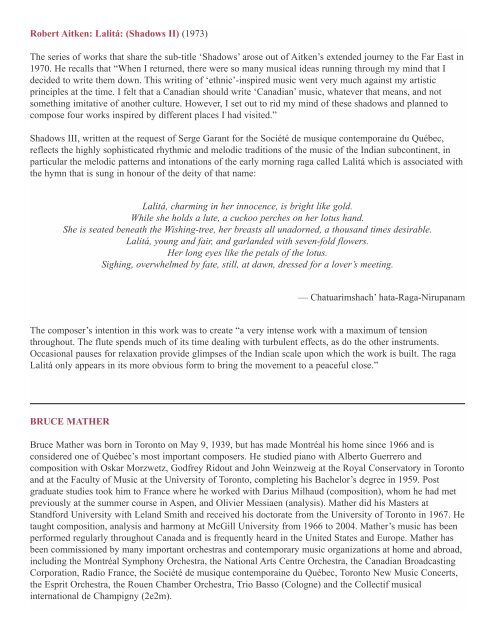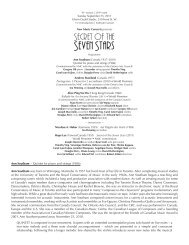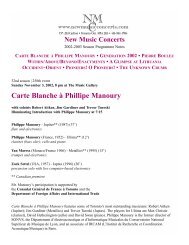2004-2005 Season The Hammerhead Consort - New Music Concerts
2004-2005 Season The Hammerhead Consort - New Music Concerts
2004-2005 Season The Hammerhead Consort - New Music Concerts
You also want an ePaper? Increase the reach of your titles
YUMPU automatically turns print PDFs into web optimized ePapers that Google loves.
Robert Aitken: Lalitá: (Shadows II) (1973)<br />
<strong>The</strong> series of works that share the sub-title ‘Shadows’ arose out of Aitken’s extended journey to the Far East in<br />
1970. He recalls that “When I returned, there were so many musical ideas running through my mind that I<br />
decided to write them down. This writing of ‘ethnic’-inspired music went very much against my artistic<br />
principles at the time. I felt that a Canadian should write ‘Canadian’ music, whatever that means, and not<br />
something imitative of another culture. However, I set out to rid my mind of these shadows and planned to<br />
compose four works inspired by different places I had visited.”<br />
Shadows III, written at the request of Serge Garant for the Société de musique contemporaine du Québec,<br />
reflects the highly sophisticated rhythmic and melodic traditions of the music of the Indian subcontinent, in<br />
particular the melodic patterns and intonations of the early morning raga called Lalitá which is associated with<br />
the hymn that is sung in honour of the deity of that name:<br />
Lalitá, charming in her innocence, is bright like gold.<br />
While she holds a lute, a cuckoo perches on her lotus hand.<br />
She is seated beneath the Wishing-tree, her breasts all unadorned, a thousand times desirable.<br />
Lalitá, young and fair, and garlanded with seven-fold flowers.<br />
Her long eyes like the petals of the lotus.<br />
Sighing, overwhelmed by fate, still, at dawn, dressed for a lover’s meeting.<br />
— Chatuarimshach’ hata-Raga-Nirupanam<br />
<strong>The</strong> composer’s intention in this work was to create “a very intense work with a maximum of tension<br />
throughout. <strong>The</strong> flute spends much of its time dealing with turbulent effects, as do the other instruments.<br />
Occasional pauses for relaxation provide glimpses of the Indian scale upon which the work is built. <strong>The</strong> raga<br />
Lalitá only appears in its more obvious form to bring the movement to a peaceful close.”<br />
BRUCE MATHER<br />
Bruce Mather was born in Toronto on May 9, 1939, but has made Montréal his home since 1966 and is<br />
considered one of Québec’s most important composers. He studied piano with Alberto Guerrero and<br />
composition with Oskar Morzwetz, Godfrey Ridout and John Weinzweig at the Royal Conservatory in Toronto<br />
and at the Faculty of <strong>Music</strong> at the University of Toronto, completing his Bachelor’s degree in 1959. Post<br />
graduate studies took him to France where he worked with Darius Milhaud (composition), whom he had met<br />
previously at the summer course in Aspen, and Olivier Messiaen (analysis). Mather did his Masters at<br />
Standford University with Leland Smith and received his doctorate from the University of Toronto in 1967. He<br />
taught composition, analysis and harmony at McGill University from 1966 to <strong>2004</strong>. Mather’s music has been<br />
performed regularly throughout Canada and is frequently heard in the United States and Europe. Mather has<br />
been commissioned by many important orchestras and contemporary music organizations at home and abroad,<br />
including the Montréal Symphony Orchestra, the National Arts Centre Orchestra, the Canadian Broadcasting<br />
Corporation, Radio France, the Société de musique contemporaine du Québec, Toronto <strong>New</strong> <strong>Music</strong> <strong>Concerts</strong>,<br />
the Esprit Orchestra, the Rouen Chamber Orchestra, Trio Basso (Cologne) and the Collectif musical<br />
international de Champigny (2e2m).




